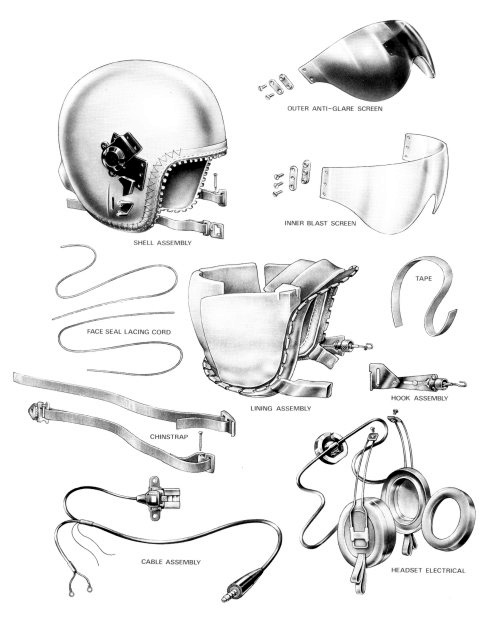Application:
The Mk.3C supercedes the Mk.1A/1G also Mk.2A and Mk.3A/3B type helmets and will cover
in one basic design, a helmet for aircrews concerned with low and high altitude (rotary
and fixed wing) with or without ejection seats. Description:
This helmet embodies communications equipment, oxygen mask attachments, and
anti-blast/anti-glare visor. It is made in four sizes and all necessary adjustments are
provided for correct individual fitting within the range covered by each of the four
sizes. The rigid outer shell of molded glass fiber resinate is provided with shock
absorbing lining or cork and an internal cradle of nylon webbing to minimize the
transmitted force and distribute it over as large an area of the head as possible. The
soft padded lining is replaceable and its attachment to the shell forms a windproof seal.
The lining can be removed either for replacement or for access to the communications
equipment or other interior fittings. Average weight of the complete helmet is 3.75lbs.
 A single miniature telephone feeds
the signal via sound tubes to acoustically designed ear capsules with fluid seals. The
capsules on an adjustable light spring wire suspension, can be held away from the face
when donning the helmet but seal snugly on the head when tensioned by the chin and nape
strap. The telephone normally has an impedance of 300 Ohms and DC resistance of 105 Ohms, but alternative impedances can be supplied. The
cable assembly terminates in a short central pigtail and NATO type plug. The headset,
seals and cable assembly are all replaceable either complete or as separate items. A single miniature telephone feeds
the signal via sound tubes to acoustically designed ear capsules with fluid seals. The
capsules on an adjustable light spring wire suspension, can be held away from the face
when donning the helmet but seal snugly on the head when tensioned by the chin and nape
strap. The telephone normally has an impedance of 300 Ohms and DC resistance of 105 Ohms, but alternative impedances can be supplied. The
cable assembly terminates in a short central pigtail and NATO type plug. The headset,
seals and cable assembly are all replaceable either complete or as separate items.
The oxygen mask attachments
hooks are designed for use with a chain toggle harness Mk.5 as on the 'P' and 'Q' type
masks. Although designed for the 'P' and 'Q' type masks the attachment and adjustment will
suit other masks with a chain toggle harness.
The anti-glare/anti-blast
visor is a double visor system with a side mounted, polycarbonate inner visor for blast
and birdstrike debris protection and an outer independently positioned glare visor. The
inner blast visor is held in the down position by a side mounted locking device.
source: Helmets LTD |